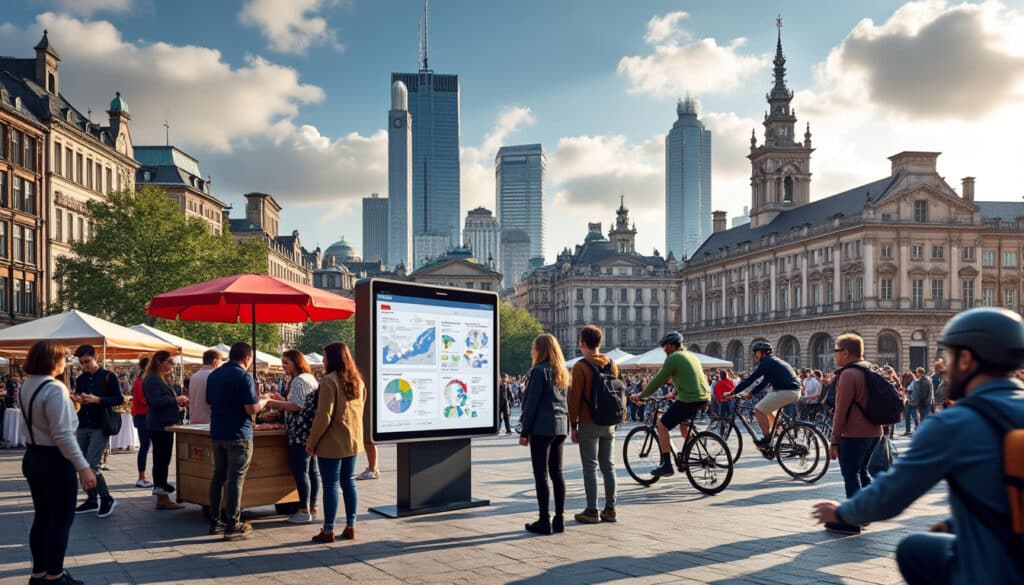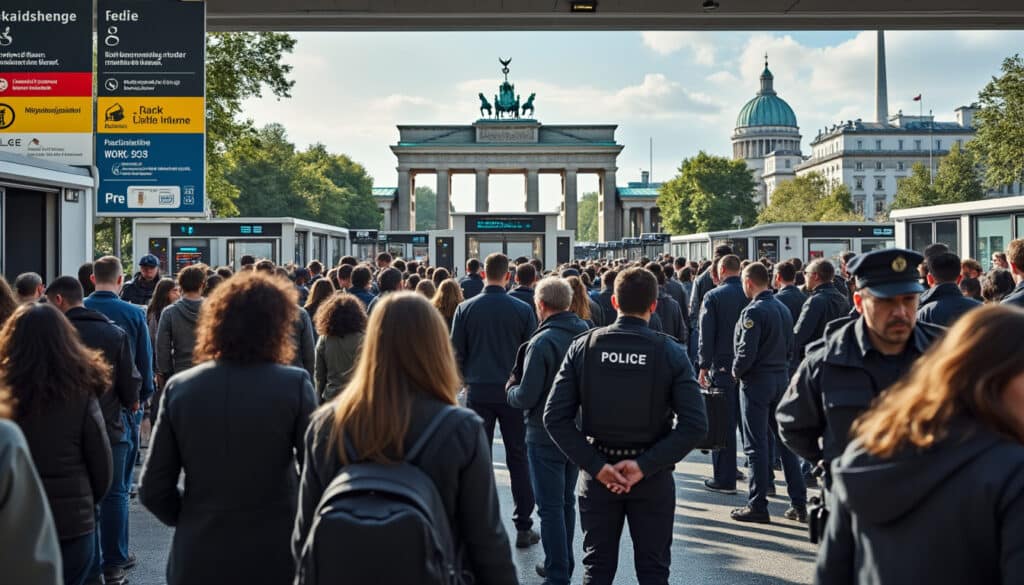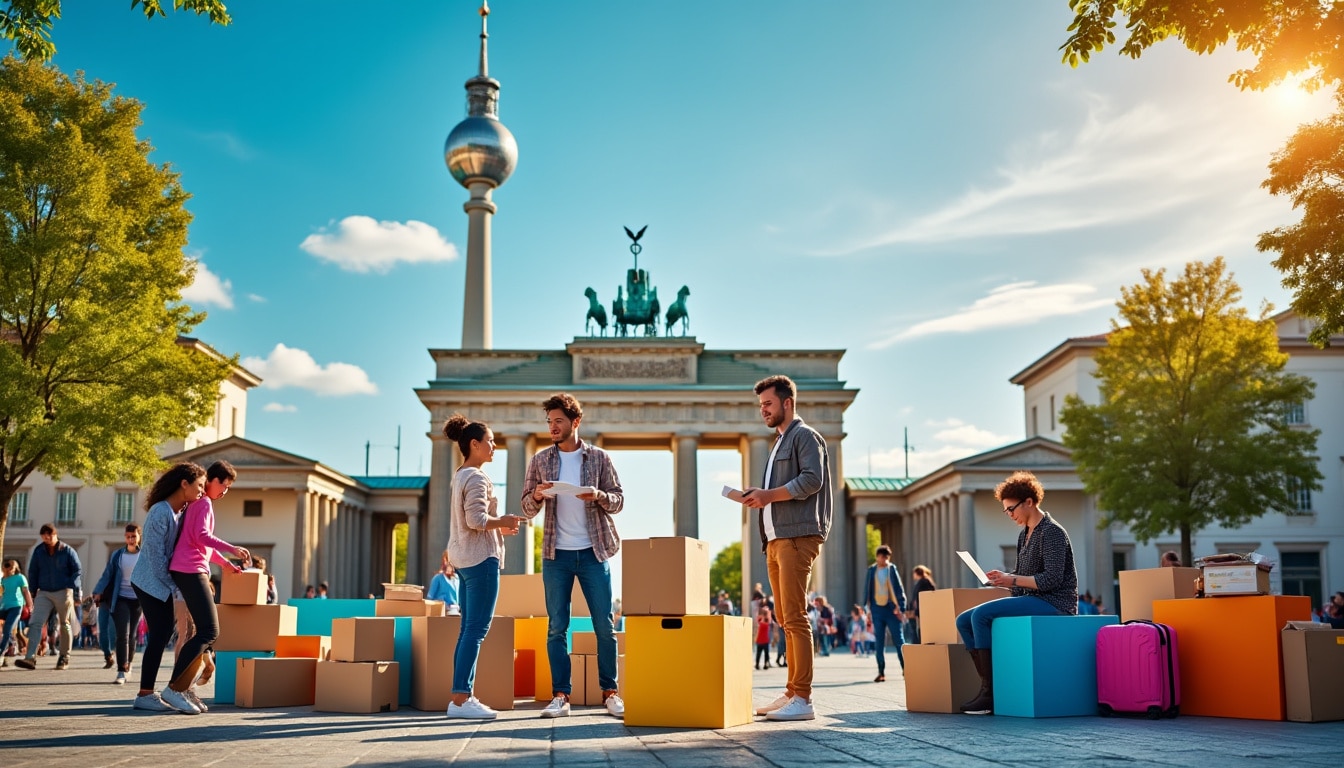Berlin, the pulsating heart of Germany, has emerged as a prime destination for those looking to immerse themselves in a rich blend of history, culture, and economic opportunity. With its thriving urban life, innovative tech scene, and welcoming expat community, Berlin promises not just a change of scenery but a transformation of lifestyle. However, moving to this vibrant city involves navigating the intricate pathways of visa applications, legal permits, and integration programs, which can be daunting without the right guidance. This article serves as your comprehensive expat guide to moving legally to Berlin, providing actionable insights and breaking down the complex bureaucracy into digestible steps.
Understanding the Berlin Immigration Services: Your First Step
Navigating the maze of Berlin immigration services is essential for anyone planning to relocate to Berlin. These services are designed to offer guidance, support, and resources to smooth your transition into the city’s dynamic landscape. Whether you’re a worker, student, or entrepreneur, understanding your visa options is the cornerstone of your migration journey.
Berlin offers a wide array of visa categories to suit various purposes, including work, study, and family reunification. One of the primary visas sought after by professionals is the EU Blue Card, which is ideal for highly qualified workers. It offers numerous benefits, such as simplified access to permanent residency and the ability to move freely within the EU.
For students, the Student Visa is a gateway to Germany’s world-renowned education system, which includes both vocational training and higher education. The process of obtaining a student visa requires proof of university admission, financial stability, and health insurance. It’s crucial to prepare all documentation early to avoid delays in your application process.
On the business front, the Freelancer Visa or the Business Visa are primary options for entrepreneurs aiming to set up a new venture. These visas demand a comprehensive business plan and financial proof to ensure you can sustain your venture and contribute positively to Berlin’s economy.
Additionally, the criminal status of the applicant is reviewed, and it is vital to provide accurate and truthful information regarding your legal history. It’s advisable to consult with international law specialists who can tailor a relocation plan specific to your circumstances, ensuring compliance with Berlin’s legal framework.

Visa Berlin: Selecting the Right Visa to Move to Berlin
Choosing the appropriate visa is crucial for a successful move to Berlin. Your visa application sets the stage for your entire relocation experience, and understanding the various options can help streamline the process.
The Work Visa is a common choice for those who have secured employment in Berlin. It requires a formal job offer from a recognized employer and proof that your salary meets the minimum threshold. This visa is typically linked to your employment contract, making it essential to ensure job stability and compliance with local employment laws.
For individuals looking to explore Berlin as potential employees before securing a job, the Job Seeker Visa is an excellent option. It grants six months in Germany to search for employment, and upon securing a position, it can be converted into a Work Visa.
A Family Reunification Visa is another pathway, designed for individuals with close family members who are legal residents of Germany. Proof of relationships, such as marriage or birth certificates, is essential, and applicants might need to demonstrate basic German language skills.
Beyond worker and family visits, Berlin offers Student Visas and Freelancer Visas. For students, having an admission letter from a recognized institution and financial proof for living expenses is required. Freelancers, on the other hand, must present a comprehensive business plan and financial support documents to validate their capacity to sustain themselves without public benefits.
Berlin Expat Solutions frequently advise on the best visa strategies to adopt, making legal moves to Berlin a seamless process, whether you’re an artist, a tech professional, or a storyteller yearning to tap into Berlin’s creative pulse.
Relocating to Berlin: A Step-by-Step Expat Guide
The physical move to Berlin involves more than just packing your bags. It includes structured steps that ensure you’re set up legally, comfortably, and smoothly in this bustling city. Here’s how you can approach the relocation process:
1. Organize Your Move: Before your departure, managing logistics for transporting your belongings is vital. Decide whether you’ll ship your furniture or purchase new items in Berlin.
2. Set Up a Bank Account: A local bank account is necessary for handling everyday transactions, receiving wages, and paying bills. You’ll need your passport and address registration (Anmeldung) to open an account.
3. Finding Accommodation: The Berlin housing market is competitive. Research neighborhoods and rental options in advance. Websites and local real estate agents can provide valuable insights into housing trends and pricing.
Explore Berlin’s demographics and geography to identify potential areas you would like to reside in.
4. Register Your Address: Within two weeks of moving into a new place, you must register your address at the local registration office (Bürgeramt). Bring your rental agreement and a Wohnungsgeberbestätigung (landlord’s confirmation).
5. Enrollment in Health Insurance: Health insurance is mandatory. Choose between public and private options based on your employment status and personal preferences.
6. Learn the Local Language: While Berlin is highly English-speaking, learning German accelerates integration and improves job prospects. Consider enrolling in language courses or joining local conversation groups. See more about languages in Berlin for comprehensive understanding.
By planning methodically and utilizing resources like the German Residence Agency and Berlin Visa Support, your settlement experience in Berlin will be less stressful and more exciting.
Living Legally in Berlin: Embracing the German Lifestyle
Once settled, embracing the vibrant lifestyle of Berlin is straightforward if you adhere to certain guidelines and maximize the available resources. Berlin is renowned for its avant-garde art scene, pulsating nightlife, and eclectic culinary offerings.
It is essential to understand Germany’s social norms and legal requirements to ensure compliance and respectful integration.
- 🔍 Understand Residency Obligations: Always keep your residence permit and registration updated. Engage with local authorities promptly to report any changes in circumstances.
- 🍛 Explore Culinary Delights: Berlin is a foodie’s paradise. Familiarize yourself with famous local foods such as Currywurst, döner kebabs, and pancakes—favorites among Berliners and expats alike.
- 🎨 Dive Into the Art Scene: Attend gallery exhibitions, street art tours, and creative workshops to integrate into Berlin’s art scene.
- 📚 Continuous Learning: Berlin offers myriad professional development courses and language schools. Engage with resources to expand your skills and network.
Moreover, joining local expat forums and communities can aid in building a supportive network. These groups often share valuable tips and foster a sense of belonging, guiding new residents through the nuances of adapting to Berlin’s lifestyle.
Living legally involves a blend of understanding regulations and fully engaging with what Berlin offers. Maintain a proactive approach to both social compliance and personal enjoyment to reap the full benefits of residing in this dynamic city.
Achieving Berlin Citizenship: The Path to Integration
For those planning a long-term stay, acquiring German citizenship opens a range of benefits and freedoms. The process is thorough, reflecting the German approach to integration and commitment to its values.
Eligibility: The general path to citizenship requires a minimum of five years of residence in Germany, holding permanent residency status, financial independence, and passing the German citizenship test. It is also imperative to demonstrate sufficient language proficiency, typically at level B1 or higher.
Application Process: Each application is evaluated on a case-by-case basis. Begin the process by gathering all required documents, including your birth certificate, passport, proof of residence, and employment or financial records. Consult the Berlin Citizenship Center for guidance and services tailored to expats aiming for citizenship.
| Requirements | Details |
|---|---|
| Residency Duration | 5+ years |
| Language Proficiency | Level B1 or higher |
| Civic Knowledge | Pass citizenship test |
| Financial Stability | Proof required |
| Legal Compliance | No criminal record |
Benefits of Citizenship: As a German citizen, you gain access to visa-free travel across many countries, governmental support for families, and the right to vote. Citizenship also strengthens your bonds with Berlin, deepening your ties to the community and its future.
The path to citizenship is a commitment toward becoming an integral part of German society. With the right resources and steady preparation, achieving this status enhances your Berlin journey, offering both personal satisfaction and professional opportunities.
FAQ
- How long does it take to process a visa application for Berlin? Generally, long-term visa applications take 6–12 weeks, though this may vary based on current workloads at German consulates.
- Can I work on a Student Visa in Berlin? Yes, students are allowed to work up to 120 days per year part-time while studying.
- What language skills are required for citizenship? Citizenship requires proficiency in German, typically at B1 level or higher.
- Is health insurance mandatory in Berlin? Yes, health insurance is compulsory for all residents in Germany.
- What is a residence permit, and how do I apply? A residence permit allows long-term stay and access to services in Germany. Apply through your local Ausländerbehörde (Foreigners’ Office) shortly after arrival.

Legal Information and Rules in Berlin
Berlin, a city that stands as a beacon of culture and history in Europe, is also a labyrinth of legal intricacies that both residents and newcomers need to navigate. Whether you’re diving into the vibrant expat community or simply relocating…

Calling and communication rules in Berlin
Berlin, a city pulsating with history and modernity, stands as a beacon of effective communication and diverse cultural interactions. Understanding calling and communication rules in Berlin is essential for anyone looking to connect smoothly with its locals, whether it’s for…

Criminal status and entry to Berlin
Navigating the intricate laws surrounding entry into Berlin while having a criminal record can be daunting. For travelers and potential residents with a past brush with the law, understanding how these records affect your chances of entry or returning to…

Drinking and age restrictions in Berlin
Berlin is a city that exudes a unique blend of history, culture, and a liberal approach to social norms, particularly when it comes to alcohol consumption. The capital city of Germany is famous not only for its rich past and…

Berlin, a city teeming with vibrant culture, historic landmarks, and a plethora of festivities, offers an intriguing array of holiday experiences year-round. From public holidays steeped in tradition to school breaks inviting exploration, Berlin’s holiday calendar is a gateway to…

Smoking, drugs, and red light laws in Berlin
Berlin, known for its vibrant culture and historic significance, is a city that has always been at the forefront of policy shifts and progressive change. As the capital of Germany, Berlin is often seen as a microcosm for the country’s…

Social and discrimination issues in Berlin
The social fabric of Berlin is as vibrant and diverse as the infamous Berlin nightlife. Yet, beneath its dynamic surface lies a complex tapestry of social and discrimination issues. This article delves into the multifaceted nature of discrimination within the…

